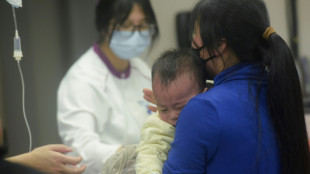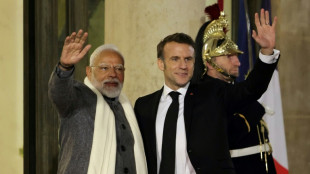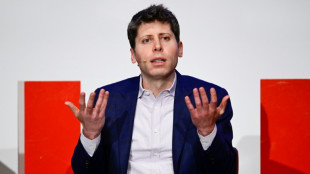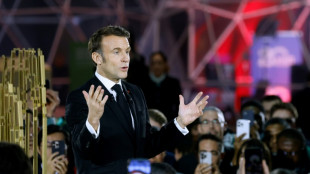
-
 Asian markets mixed as tariff uncertainty looms large
Asian markets mixed as tariff uncertainty looms large
-
South Korea's Yoon blames 'malicious' opposition for martial law bid

-
 Russia's 'shadow fleet' brings 'high risk' of oil spill
Russia's 'shadow fleet' brings 'high risk' of oil spill
-
Doncic off the mark as Lakers rout Jazz

-
 Trump signs executive orders for steel, aluminum tariffs to start March 12
Trump signs executive orders for steel, aluminum tariffs to start March 12
-
Trump floats Ukraine 'may be Russian someday' ahead of Zelensky-Vance meeting

-
 Pacific nation Vanuatu elects prime minister
Pacific nation Vanuatu elects prime minister
-
'My own Apocalypse Now': 'White Lotus' returns with steamy Thailand romp

-
 Malaysia's Hindus mark Thaipusam festival with fervour
Malaysia's Hindus mark Thaipusam festival with fervour
-
Philippine divorce activists vow to fight on

-
 Virus disinformation drives anti-China sentiment, lockdown fears
Virus disinformation drives anti-China sentiment, lockdown fears
-
World leaders seek elusive AI common ground at Paris summit

-
 Asian markets swing as tariff uncertainty looms large
Asian markets swing as tariff uncertainty looms large
-
Venezuela sends planes to fetch irregular migrants from US

-
 Google changes name of Gulf of Mexico to 'Gulf of America' for US users
Google changes name of Gulf of Mexico to 'Gulf of America' for US users
-
YouTube, the online video powerhouse, turns 20

-
 Playgrounds come alive again with Brazil school phone ban
Playgrounds come alive again with Brazil school phone ban
-
'So fast': NY subway shove survivor captures commuter fears

-
 Could a climate megaproject cloud Chile's unparalleled views of universe?
Could a climate megaproject cloud Chile's unparalleled views of universe?
-
Trump's tariff tactics may reshape global trade: analysts

-
 Trump warns 'all hell' will break loose if Gaza hostages not returned
Trump warns 'all hell' will break loose if Gaza hostages not returned
-
Trump warns of 'all hell' if Gaza captives not freed by Saturday

-
 Trump signs executive orders on steel, aluminum tariffs
Trump signs executive orders on steel, aluminum tariffs
-
Elon Musk heads group trying to buy control of OpenAI: report

-
 Young, Irving replace Giannis, Davis in NBA All-Star line-ups
Young, Irving replace Giannis, Davis in NBA All-Star line-ups
-
US judges challenge Trump cuts as legal battles mount

-
 Celtic's Maeda cleared to face Bayern Munich
Celtic's Maeda cleared to face Bayern Munich
-
Global stock markets brush off latest Trump tariffs

-
 Union sues over US consumer protection agency work pause
Union sues over US consumer protection agency work pause
-
Inter a point behind leaders Napoli after squeezing past Fiorentina

-
 Palace sink Doncaster to book clash with rivals Millwall
Palace sink Doncaster to book clash with rivals Millwall
-
Ntamack banned for Italy game despite France efforts

-
 Duterte's future in balance as Philippine election season kicks off
Duterte's future in balance as Philippine election season kicks off
-
At least 55 dead after Guatemala bus plunges into ravine

-
 Ronaldo reaches deal with Saudi club Al Nassr to extend contract: source
Ronaldo reaches deal with Saudi club Al Nassr to extend contract: source
-
Man City still worst opponent for Real Madrid, says Ancelotti

-
 Trump team orders work pause at US consumer protection agency
Trump team orders work pause at US consumer protection agency
-
'Just not ready' - Tiger Woods pulls out of Torrey Pines tournament

-
 Zelensky to meet JD Vance in Munich on Friday: Kyiv presidency
Zelensky to meet JD Vance in Munich on Friday: Kyiv presidency
-
Church of England meets amid 'crisis' over abuse scandals

-
 Macron vows at summit France to 'deliver' on AI acceleration
Macron vows at summit France to 'deliver' on AI acceleration
-
NY jury hears attacker 'dangerously close' to killing Salman Rushdie

-
 Steel at heart of new Trump trade war
Steel at heart of new Trump trade war
-
Hamas says stops Gaza hostage release 'until further notice'

-
 Cycling: five rough diamonds who dream of being the new Pogacar
Cycling: five rough diamonds who dream of being the new Pogacar
-
'I don't have time': Mother of jailed UK-Egyptian makes Starmer plea

-
 Feyenoord coach Priske pays for 'lack of chemistry'
Feyenoord coach Priske pays for 'lack of chemistry'
-
White S. Africans clamour for US resettlement after Trump order

-
 Kanye West's account on X goes dark after hate-filled rant
Kanye West's account on X goes dark after hate-filled rant
-
US federal workers weigh Trump buyout as court to step in


Playgrounds come alive again with Brazil school phone ban
In Rio de Janeiro, children are playing again "like in the old days," and their focus in class has improved after a school cellphone ban pioneered in the city that has now gone national.
Students across the country of more than 200 million people are starting the school year with phones banned from classes and break time after a new law signed by President Luiz Inacio Lula da Silva in January.
Brazil, which has more smartphones than people, joins a growing number of nations using such bans to pry devices from the hands of children hooked on social media.
"It was difficult because we get addicted and ... it ends up causing a certain withdrawal ... but after the habit passes, we interact more," said Kamilly Marques, 14.
A student at the Reverend Martin Luther King public school in Rio de Janeiro, Marques told AFP she didn't even bother bringing her phone to school anymore, a year after the city first implemented the ban.
She is not alone. Only a few students now stop under a large mural of the US civil rights hero to place their devices in plastic boxes before heading to class.
Marques said that while she first thought the ban was "annoying" and "boring", she is happier with her improved grades and social life.
"There was a classmate who was cyberbullied, and we didn't even know, because we were more focused on our phones than on our friends, you know?" she said.
- Addicted and anxious -
UN culture and education body UNESCO said that at the end of 2024, 40 percent of global education systems had some sort of ban on smartphone use in schools, up from 30 percent a year earlier.
Rio's municipal education secretary, Renan Ferreirinha, told AFP that officials had noticed children returning to classrooms after the Covid pandemic "more agitated, more impatient, more addicted to cell phones and much more anxious."
A 2024 survey of parents by digital research company Opinion Box and mobile industry platform Mobile Time showed most Brazilian children got their first cellphone at an average of 10 years old.
While children under the age of three were spending almost an hour and a half a day on smartphones, this rose to almost four hours for those between 13 and 16.
A study carried out by the Rio de Janeiro municipality in September showed improvements in concentration, class participation and student performance since the school ban was implemented.
Ferreirinha, who is also a federal lawmaker, acted as rapporteur for the law which took the ban nationwide.
If moderating cellphone use "is difficult for an adult, imagine what it's like for a child. It doesn't make any sense for a teacher to be trying to teach a class while the child is watching a video on social media or playing a game on their phone," he said.
On a recent school visit, one child told him they were back to playing like kids did "in the old days."
- 'Much happier' -
Fernanda Heitor, 46, the deputy director of the Reverend Martin Luther King school -- which has students aged six to 16 -- said classes had become unsustainable before the ban.
"There was resistance. Even today, some still hide their cell phones when they enter the school," she said.
She described break time previously as "islands" of children sitting glued to their phones.
"They didn't interact, there wasn't much play, they didn't talk. Now they play... It's transformed the school. It's become much happier, much more lively."
Brazil's new law allows cellphone use for educational purposes, emergencies and health purposes.
Fabio Campos, an expert on education and technology, told AFP that while he believed the law was necessary, students should be taught how to use technology responsibly.
"Brazil is a country of inequality. Many students only have access to technology at school. So, if this means that schools will become less technological, it is a failure."
Ferreirinha said parents also need to impose more limits at home.
At the Reverend Martin Luther King school, Pedro Henrique, 11, still brings his smartphone to school every day and uses it a lot at home.
"I miss the cellphone a little," during breaktime, he admits, adding that at the end of the day "I feel happy, because I'll be with my cell phone and using it."
P.Anderson--BTB
